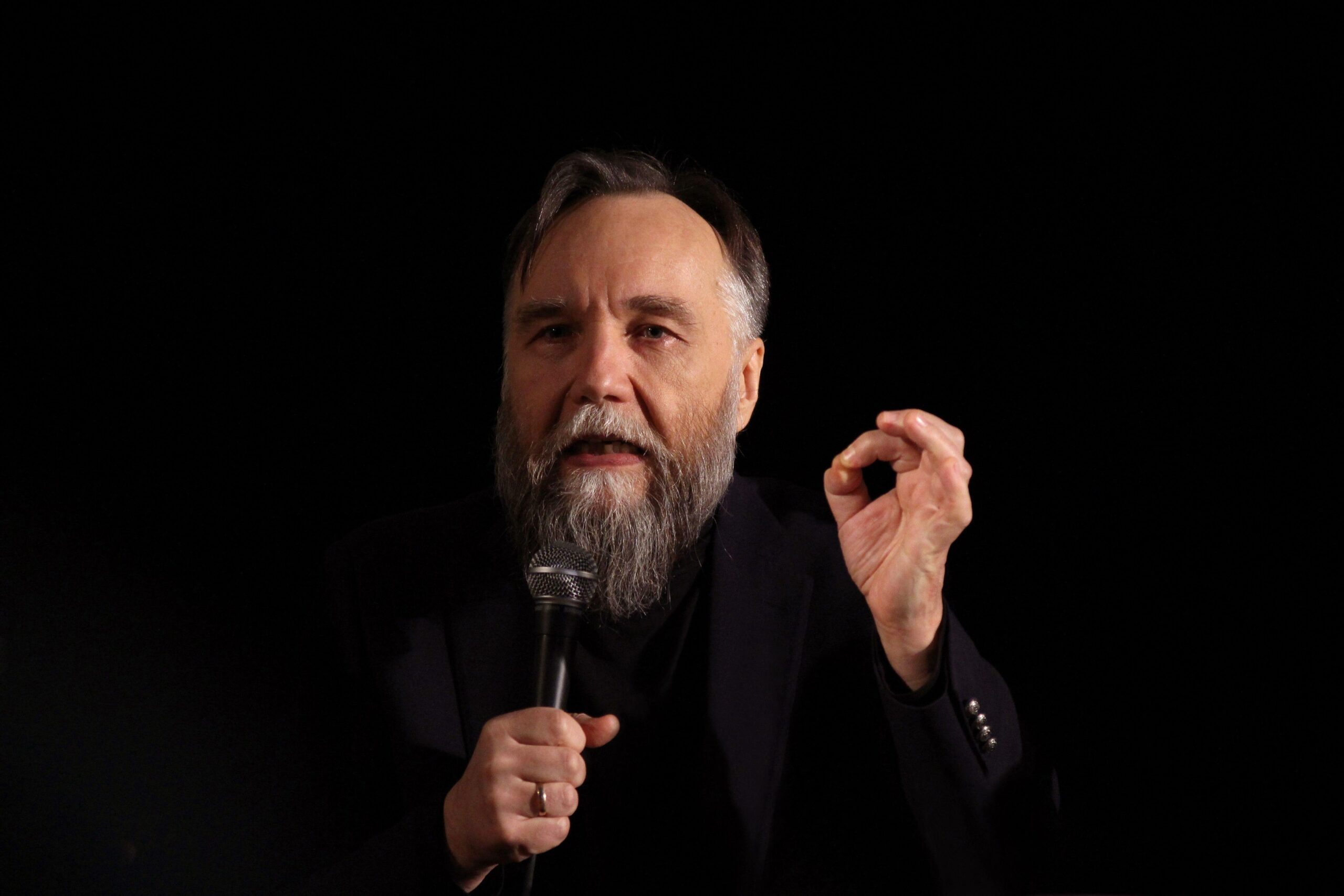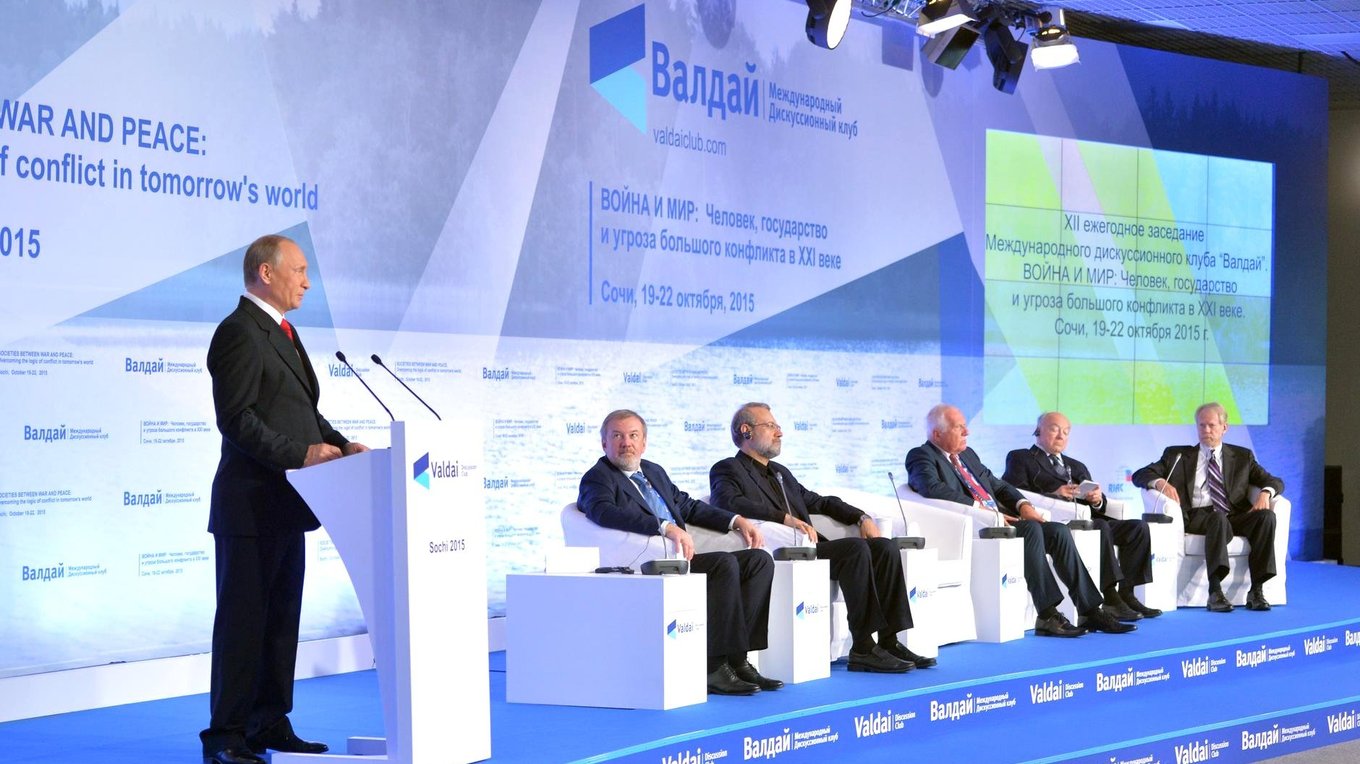A real Russian heart: Aleksandr Dugin, Vladimir Putin and the dangerous new Russian ideology
Furthermore, the Kremlin’s decisions, especially about the war in Ukraine, increasingly resemble Dugin’s ideological goals. It is no exaggeration to call Dugin a prophetic political theorist – he is the man who best sees the philosophical significance of Russia’s geopolitical position and Ukraine’s challenge to it.
The Kremlin recognised the significance of the attack on Dugin and his daughter. Shortly after Dugina’s death, Russian president Vladimir Putin posthumously awarded her the Order of Courage. In his remarks, he described her as a ‘true patriot,’ and a ‘bright, talented person with a real Russian heart’. Putin and the Kremlin’s communications apparatus have attempted to tie the war in Ukraine closely to the kind of reactionary ideology Dugin and his associates have promoted for decades. In lionising his daughter, the Kremlin has given Dugin and his ideology its stamp of approval.
The ideological vision advanced by Dugin, and increasingly embraced by Putin, is nothing short of suicidal. It provides twisted justifications for nuclear brinkmanship, and it encourages other non-Western countries to challenge the global order America carefully constructed in the wake of the twentieth-century’s cavalcade of violence and tyranny. Dugin’s ideological position is complex, but understanding it can shed light on the future of the Ukraine conflict.
Wars are fought with bullets and missiles, but they are also fought to advance philosophies and ways of life. Russia understands this – the West must, too.

engelsbergideas.com
I also have articles:
Why Ivan Ilyin is not Putin’s Ideological Guru

ridl.io
Since Vladimir Putin came to power in 2000 and began reasserting Russia’s influence on the international scene, Western pundits have tried to discern the Russian president’s “brain” or “guru”, convinced that they would be able to identify some shadowy Svengali-like character who would inspire him. Unfortunately, this quest is a lost cause: Putin has had several “gray cardinals”—Vladislav Surkov being probably the most famous—who have helped over the years to shape Russia’s master narrative and the president’s personal image, but there is no single ideological source to be found. On the contrary, the Russian presidential administration cultivates a plural doctrinal market with a flock of advisors offering several mixed ideological products for public consumption.
The person most often identified as Putin’s guru has been so far Alexander Dugin, the Eurasianist and fascist geopolitician. Western experts have mistakenly overstated Dugin’s influence because of his role in popularizing the Eurasianist terminology and neo-imperial projects. However, there is no direct link between Dugin’s neo-Eurasianism and Putin’s Eurasian Union project. Dugin’s ideological repertoire is drawn from the German Conservative Revolution and the French and Italian New Right far more than from the Eurasianist founding fathers of the interwar period. High-ranking Russian officials in charge of the Eurasian Economic Union institutions take their inspiration from Jean Monet and other advocates of a united Europe or from Beijing’s rhetoric of Chinese-style harmonious development, but not from classical
Eurasianism. Even as the Eurasian Economic Union takes institutional form, Dugin has failed to acquire any institutional status – he is not a member even of the Civic Chamber and lost his position at Moscow State University during the 2014
Ukrainian crisis – and his theories are too esoteric and philosophical to compete with more mainstream ideological products.
Since 2014, the title of being Putin’s inspiration seems to have shifted to the émigré thinker Ivan Ilyin (1883–1954). Ilyin’s new prominence was first noted by Anton Barbashin and Hannah Thoburn and then by Timothy Snyder. For the latter, Ilyin should be seen as “
a prophet of Russian fascism,” therefore legitimizing
post-mortemPutin’s alleged “fascist turn” since the Ukrainian crisis—a “turn” pointed out by other scholars such as
Alexander Motyl and
Vladislav Inozemtsev. Ilyin’s new acquired status is now widely accepted and propagated by Western experts without any discussion about the legitimacy of this claim. I argue here that not only Ilyin is not Putin’s “guru,” but that Ilyin’s ideological legacy in contemporary Russia is more complex than that of “fascism”.
Ilyin has not become Putin’s official ideological reference or “
Putin’s philosopher”. Putin has quoted Ilyin on only five occasions (in 2005, 2006, 2012, 2013 and 2014); three of these were addresses to the federal assemblies and two to military audiences. This number of quotes is far fewer than those from many other thinkers among the regime’s pantheon. Putin has referred many times to historians such as Nikolai Karamzin (1766–1826), symbols of classical Russian historiography, or political figures such as Petr Stolypin (1862–1911), the embodiment of Russia’s modernization path at the beginning of the 20th century. Even the impressive “Russia–my history” historical park, funded by the Moscow Patriarchate and the Moscow city government, which features more than 300 quotations on Russia on the walls, offers only 10 quotes from Ilyin, far fewer than many classic Russian historians and philosophers. Dmitri Badovsky’s ISEPI (Institute for Social-Economic and Political Research:
Institut sotsial’no-ekonomicheskikh i politicheskikh issledovanii), the main think-tank engaged in elaborating a conservative ideology for the Kremlin, organized seminars dedicated to Nikolia Berdiaev, not to Ilyin. And then Russian senior officials were instructed by Surkov to read some classic authors, they received books indeed of Ilyin, but also Berdiaev and the Silver Age philosopher Vladimir Soloviev.
Moreover, none of the five quotations by Putin—or the two Ilyin passages cited by Vladislav Surkov in 2006 to promote his own notion of “sovereign democracy”—is from Ilyin’s most tendentiously pro-fascist texts. Indeed, like many of his contemporaries, Ilyin was a rabid anti-Semite and anti-Bolshevik who indeed was attracted to fascism, which he saw as spiritually close to the White émigré ideology, with a
“common and united enemy, patriotism, a sense of honor, voluntary-sacrificial service, an attraction to dictatorial discipline, to spiritual renewal and the revival/rebirth of their country, and the search for a new social justice.”
He fled Nazi Germany but remained devoted to the “lighter” fascism embodied by Francisco Franco in Spain and António de Oliveira Salazar in Portugal. However, Ilyin’s oeuvre is massive, filling several tomes, and his vision of Russia’s “essence” and ideal political regime was in fact among the most classic, and uninventive one: as many other Russian political thinkers, Ilyin saw Russia’s essence in autocracy, statehood, messianism and cultural exceptionalism. There is nothing particularly fascist here, just the most conventional vision of Russia.
Ilyin’s quotations by Putin—as well as by Surkov or the one by Minister of Foreign Affairs Sergey Lavrov—are from the most stereotyped ones, celebrating the Russian state as the embodiment of law, the soldier as personifying the nation, Russia’s eternal statehood, and in 2014, Putin quoting “
That who loves Russia should wish to him freedom.” All these quotations mirror the most conventional framing about Russia, its culture, and the role of the state; none of them is related to the most controversial statements that Ilyin made on Nazi Germany or Fascist Italy. When Ilyin is brought to the Kremlin’s pantheon, it is for very mainstream statements, not for his fascist convictions.
Western proponents of Ilyin’s “guru” status point out that Putin consecrated his grave in 2009 (see below), and that the 150-minute documentary film aired to celebrate Putin’s fifteen years in power in 2015 devoted several minutes specifically to Ilyin. Here, too, a closer look evidences not Putin’s identification with Ilyin, but another, more complex trend. Putin is an arbitrator among different stakeholders, as well as between different ideological factions, and, as the personification of the Russian state, he secures equilibrium among them. One of these ideological factions—one among several—pushes for rehabilitating Ilyin and making him a martyr of the White emigration, on equal status with White General Anton Denikin (1872–1947). This faction comprises the Moscow Patriarchate and some of its most political personalities, such as Father Tikhon, Orthodox businessmen such as Vladimir Yakunin and Konstantin Malofeev and a group of pro-monarchy intellectuals such as Nikita Mikhalkov, who directed the Putin documentary. The Church was the driving force behind the repatriation of Ilyin’s remains and his reburial at the Donskoy Monastery in 2005, at the same time as Denikin’s and his spouse’s.
Rehabilitating Ilyin is part of this faction’s broader agenda of reintegrating the White émigré past into the national master narrative. This policy coincides with the Church’s strategy of advancing conservative, even reactionary values, alongside nostalgia for the Romanov Empire. But these groups are celebrating the cultural continuity with the Tsarist past, not a specific brand of Russian fascism. Obviously, reintegrating White supporters into the national pantheon implies rehabilitating émigrés who collaborated with fascist regimes against the Soviet Union—but that dilemma is not exclusive to Russia. All Eastern European countries face the same difficulties in reintegrating collaborationist movements into their national past. Ilyin earned a posthumous place in the national pantheon because this faction regards him as the personification of White ideology—and Denikin of the White movement per se.
Ivan Ilyin has been held up as the ideological inspiration of this pro-Orthodox, pro-emigration and pro-Romanov faction, but he is
not that of the Kremlin, the presidential administration or of Putin himself, which have built a much more plural pantheon of ideological references. Ilyin has been quoted by Putin relatively few times compared to other Russian thinkers, and the selected quotes are harmless statements. Ignoring Putin’s plurality of ideological references to demonstrate his alleged admiration for a ‘fascist’ thinker does not offer meaningful insight into the Kremlin’s thinking or “Putin’s mind”. Weak attempts to blame an obscure dead philosopher for the
Kremlin’s alleged meddling in the 2016 U.S. presidential election are an even more unproductive tactic that intends to restrict other, less name-calling, explanations of the Russian state’s functioning and ideological construction.
A developing narrative about why Putin invaded Ukraine is that his thinking was influenced by fascist Russian philosophers. But that account is both reductive and lacking in evidence. Alexander Dugin, the man who’s been called the brains behind Putin, has no direct connection to the Kremlin, and...

iai.tv
A developing narrative about why Putin invaded Ukraine is that his thinking was influenced by fascist Russian philosophers. But that account is both reductive and lacking in evidence. Alexander Dugin, the man who’s been called the brains behind Putin, has no direct connection to the Kremlin, and his overall influence is hugely exaggerated. Ivan Ilyin, the other philosopher who is said to have influenced Putin’s thinking, is a more plausible candidate but in his case the label ‘fascist’ is a caricature, at odds with a large part of his philosophy. Calling thinkers or political leaders fascist is an easy way to dismiss them out of hand, blocking a deeper understanding of Putin’s real motives and the ideas that have informed his world view, argues Paul Robinson. 











